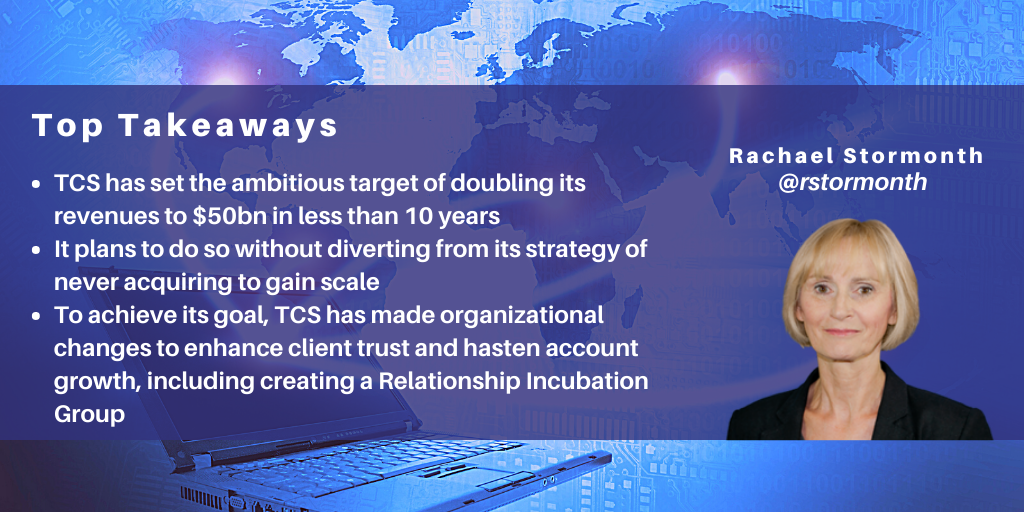Search posts by keywords:
Filter posts by author:
Related Reports
Related NEAT Reports
Other blog posts
posted on Nov 28, 2022 by Rachael Stormonth

In its Q3 FY22, TCS delivered its sixth consecutive quarter of organic growth around the 15% mark. Despite the uncertain macroeconomic background, TCS has a strong pipeline for at least the next two quarters and has yet to see any softening in the market. For example, it was expecting some softening in Europe in the September quarter but instead achieved both increased revenue growth and a strong order book.
Nonetheless, enterprises are typically starting to focus more on execution rather than envisioning and on programs with a clear, well-defined set of outcomes. TCS perceives that some enterprises might be becoming more realistic about some of their more fanciful projects with long-term RoI. This perception ties in well with recent NelsonHall research, which shows a continuing high emphasis and level of intention for short-term transformations with high RoI, but with some longer-term projects with less certain RoI being put on hold.
TCS is not experiencing widespread vendor consolidation within accounts but is seeing some increase in share within some of its major clients as they push incremental business towards the stronger vendors in their vendor portfolios.
Renewed Travel also Boosting Client Relationships
The normalization of travel is also now working in TCS’ favor. During lockdown and travel restrictions, TCS had to extensively use contractors for minor roles needing personnel onsite at client locations for periods of, say, 3-4 months. Now TCS is reverting to sending visa holders from India, which has the triple benefit of improving both customer and employee satisfaction and delivering cost reduction.
Nevertheless, like its peers, TCS still faces the widespread issue of managing the return to the office. Employees in IT services companies typically became very comfortable working from home during the pandemic, but companies are finding that this has had an impact on company culture and strength of allegiance, among other things. However, managing the return to the office has to be done carefully in order to avoid alienating staff. TCS’ approach is to request middle and senior-level personnel to typically work in the office most days, encouraging attendance by more junior personnel, some of whom now go into the office 2-3 days per week, and others continuing to work primarily from home.
Pursuing Bold Ambitions
In a departure from its traditional reticence, the TCS management is now openly referring to ambitions for the company to reach $50bn in annual revenue – and to do so without diverting from its strategy of never acquiring to gain scale.
TCS is looking to get to $50bn in less time than it took to move from $10bn to $25bn, a period of 10 years. This is an aggressive target, particularly given TCS’ emphasis on organic growth. However, with technology valuations softening, TCS may become more active in acquiring for new capabilities: any such transactions would be bolt-ons. After reaching $5bn in FY08, TCS has typically taken around three years to add each subsequent $5bn to its revenues, reaching $10bn in FY12, $15bn in FY15, $20bn in FY19, and now $25bn in FY22.
Changing the Organizational Structure to Enhance Client Trust and Hasten Account Growth
To achieve its goal of getting to $50bn in less than ten years and facilitate account revenue growth, TCS has made some changes to its organizational structure and adopted a novel, confident and distinctive approach to handling different tiers of accounts.
Firstly, it has taken steps to reduce the delivery uncertainty that enterprises can have when they have modest spend with a new vendor. Previously, TCS’ account management was verticalized, with the potential danger of business unit heads focusing on the higher revenue accounts to the detriment of the lower revenue accounts. All TCS mainstream accounts are typically Global 2000 enterprises, so even the lower revenue accounts have massive potential.
To address this issue and make smaller accounts feel they are important to TCS, it has created a new business group, Relationship Incubation Group. This group works with the ~500 newly acquired clients using a high-touch engagement model to overcome delivery anxiety and build a foundation of trust. The new unit is horizontal rather than vertical and is organized geographically into “small regions” with regional managers. It strongly focuses on delivery and client handholding and avoids cross-selling and up-selling.
Once trust is established, and account revenues are, say, $5m to $10m, the governance of the account transfers to Enterprise Group, which is geared to upselling and cross-selling to facilitate clients consuming a much wider range of TCS services and accelerate revenue growth in each account. This group adopts TCS’ traditional account management approach and is entirely verticalized.
Finally, the largest clients, those with over $100m spend with TCS and who view TCS as a trusted transformation partner, are governed by TCS’ Business Transformation Group. TCS currently has 59 clients that generate at least $100m in annual revenue, an impressive number that will clearly continue to increase.
TCS is not a company that regularly states bold ambitions, but when it does those ambitions are invariably achieved: the only question is when TCS will reach its $50bn target. Will it be as early as FY27?
